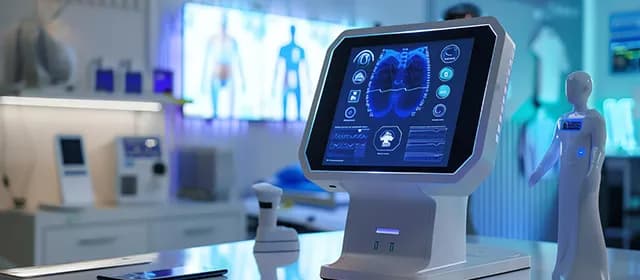Health care is rapidly becoming a data-driven field, and health informatics sits at the center of that shift. Nearly all non-federal acute care hospitals in the United States had adopted a certified electronic health record (EHR) system by 2021, about 96%, showing how widespread digitization is in clinical care (Source: pmc.ncbi.nlm.nih.gov).
Most hospitals are also sharing information across systems: in 2023, 70% of hospitals engaged in all four domains of interoperable exchange (send, receive, find, and integrate), up from 46% in 2018. That progress has helped clinicians access patient data more quickly and coordinate care more effectively (Source: www.ncbi.nlm.nih.gov)
There are roughly 6,093 hospitals in the United States, which helps explain why scalable informatics tools, from EHRs to clinical decision support and population-health platforms, are needed across so many sites of care (Source: www.aha.org).
Beyond records and exchange, digital health technologies are growing fast. For example, the digital therapeutics sector and other clinical software have shown strong expansion in recent years, pointing to rising investment in software that directly supports diagnosis, monitoring, and treatment. These trends — near-universal EHR adoption, stronger interoperability, and fast growth in clinical software — set the stage for the companies leading advances in health care informatics today.
Researchers at Kings Research forecasted a massive increase in revenue in the health informatics market. It is estimated to reach a value of 87.79 billion dollars by 2031, up from 35.60 billion dollars in 2023. This blog highlights the top 10 healthcare informatics companies that are significantly contributing to market expansion.
Top 10 Healthcare Informatics Companies Leading Innovations in 2026
Below are the top ten companies leading the way in digital health, organized by their global presence.
1. Johnson & Johnson Services, Inc.
Johnson & Johnson is a global leader in healthcare, leveraging data science and real-world evidence (RWE) to enhance patient care. In June 2024, the company introduced the Polyphonic Digital Ecosystem, a suite of tools designed to improve surgical collaboration and data management. This system enables surgeons to securely share and analyze surgical videos, fostering better decision-making and outcomes.
2. Altera Digital Health Inc.
Altera Digital Health specializes in healthcare IT solutions, providing comprehensive electronic health records (EHR) and integrated systems. Recently, the company has focused on enhancing interoperability and data analytics to support population health management, aiming to deliver more personalized and efficient patient care.
3. Medtronic
Medtronic is a prominent medical technology company, advancing healthcare through innovative devices and therapies. They have developed the CareLink Network, a remote monitoring system that allows healthcare providers to track patients' cardiac device data, thereby improving patient management and outcomes.
4. Koninklijke Philips N.V.
Philips is a global leader in health technology, offering a range of healthcare informatics solutions. The company recently launched Philips HealthSuite, a cloud-based platform that integrates and analyzes health data from various sources, enabling healthcare providers to deliver personalized care plans.
5. Veradigm LLC
Veradigm, a subsidiary of Allscripts, focuses on transforming healthcare through data-driven insights and innovative solutions. Their recent advancements include expanding data analytics capabilities and creating platforms that enhance clinical workflows and patient engagement.
6. Change Healthcare
Change Healthcare provides comprehensive solutions for revenue cycle management, payment accuracy, and value-based care. They have recently introduced new analytics tools that help healthcare providers improve financial performance and patient outcomes by analyzing data from various healthcare transactions.
7. Oracle
Oracle offers a range of solutions in healthcare informatics, focusing on cloud-based applications and data analytics. A recent development is the Oracle Health Sciences Clinical One platform, which streamlines clinical trial processes and enhances data integration for more efficient research and patient care.
In September 2024, Oracle Corporation introduced new innovations within its electronic health record (EHR) platform, adding streamlined chart reviews, mobile charting, advanced medication error checks, and AI-powered clinical assistants to boost clinician productivity, enhance interoperability, and strengthen security across care settings.
8. Greenway Health, LLC
Greenway Health provides integrated EHR, practice management, and revenue cycle services. They have recently focused on improving data interoperability and patient engagement tools, such as their Greenway Patient Portal, which facilitates better communication between patients and providers.
9. OSP (Optimal Strategix Group, Inc.)
OSP is known for its custom software solutions in healthcare, including telehealth and health analytics platforms. Recently, they have been working on AI-driven tools to improve patient care by providing predictive analytics and personalized health insights
10. AKASA
AKASA is a health informatics company based in San Francisco that specializes in using artificial intelligence (AI) and machine learning (ML) to streamline complex healthcare workflows. The company's primary focus is on reducing financial and operational inefficiencies in the American healthcare system, ultimately helping clients lower operational costs and improve patient outcomes. AKASA collaborates with a network of Silicon Valley partners to develop advanced health informatics software, ensuring high-quality solutions for its clients.
Why is Healthcare Informatics Important?
Improving the effectiveness and caliber of healthcare delivery requires a strong foundation in healthcare informatics. Information technology is incorporated with healthcare procedures to enhance patient outcomes, optimize workflow, and promote more informed decision-making. Informatics specialists contribute to the improvement of provider care coordination and the decrease in medical errors by organizing and analyzing enormous volumes of health data.
Furthermore, by giving patients access to their medical information and educational materials, healthcare informatics empowers patients and promotes a more patient-centered approach to care. This change enables people to actively participate in their health management while also improving patient engagement. Informatics plays an increasingly important role in making sure that data is used efficiently to promote changes as healthcare organizations increasingly use digital technologies like electronic health records (EHR).
Top 5 Healthcare Informatics Trends to Watch Out for
Interoperability: Current EHR systems often struggle to communicate with each other, leading to inefficiencies. Interoperability ensures that various systems—devices, software, and applications—can exchange and integrate data seamlessly, enhancing overall efficiency and information flow in healthcare.
Consumerization: There's a generational gap in digital literacy, with younger patients more adept at using technology than older ones. Health informatics aims to bridge this gap by improving access and fostering open communication between healthcare providers and patients, regardless of age.
Health Data Analytics: The digitization of healthcare has led to an explosion of patient data. Health informatics leverages Big Data tools and advanced algorithms to process this data, resulting in more personalized care and better patient outcomes.
Wearable Devices: Innovations in sensor technology and AI are transforming wearables from basic fitness trackers to comprehensive health monitors. These devices now track various biometrics like heart rate, sleep patterns, and even blood sugar levels, playing a crucial role in both personal and clinical health management.
Artificial Intelligence: AI enhances early disease detection and personalized medicine by analyzing medical images and patient data, including genetic information. This allows for more precise treatments and better outcomes with fewer side effects.
Winding Up
In short, the health care informatics field is expanding because systems are now widely digitized and more able to share data. Key players are helping this growth by improving interoperability standards, embedding AI and clinical decision support into workflows, moving services to secure cloud platforms, building partnerships with providers and public-health organizations, and investing in training so clinicians can use new tools safely and effectively. These combined efforts are making care more connected, more data-driven, and better able to support clinical and population health goals.

.webp&w=3840&q=75&dpl=dpl_HkC6vhtovZ9gdp5f4CCyQszcdnYs)

